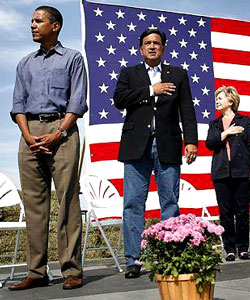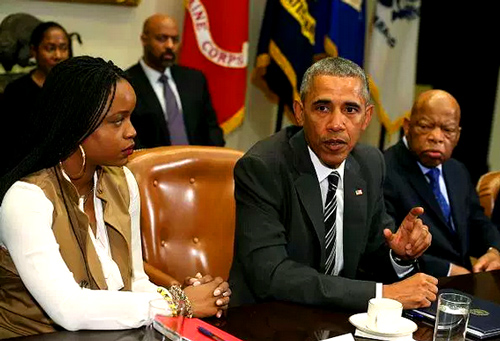High Stakes For Limited Learning
"Should America’s colleges and universities feel a duty to ensure that the citizens and leaders of the future have a robust understanding of the history of the nation? It would be reasonable to expect that a college education would include a mature and balanced study of the story of our nation, the high and low points in our history, our successes and failures. That, after all, is an indispensable foundation for meaningful participation in a democratic republic.
- Although it is reasonable to assume that at America’s top-ranked colleges and universities, education for meaningful citizenship would be a priority, that is a false assumption. -
We would also expect that students who major in history would receive particularly rigorous instruction in the history of the United States and the development of its institutions of government.
It is common sense. Maintaining our form of government requires knowledge of our institutions of government, how they evolved over time, the strengths and weaknesses they have shown.
Our Founders knew this. James Madison wrote that such learning is 'the best security against crafty and dangerous encroachments on the public liberty.' Thomas Jefferson, in planning the University of Virginia, considered it a legislative mandate 'to form the statesmen, legislators, and judges, on whom public prosperity and individual happiness are so much to depend.' It would be an obligation for the new university 'to expound the principles and structure of government.'
Although it is reasonable to assume that at America’s top-ranked colleges and universities, education for meaningful citizenship would be a priority, that is a false assumption.
The American Council of Trustees and Alumni (ACTA) has delved into the requirements and course offerings in history departments at 76 of the nation’s leading colleges and universities to see how U.S. history fits into their programs. To do so, ACTA relied on the U.S. News & World Report’s rankings of the top 25 liberal arts colleges.
How College History Departments Leave The United States Out Of The Major
The top 25 national universities, and the top 25 public institutions. (These rankings include ties.) Our findings in this report demonstrate that the overwhelming majority of America’s most prestigious institutions do not require even the students who major in history to take a single course on United States history or government.
Disregard for the importance of United States history in the undergraduate history major is matched by the overall disappearance of United States history requirements from general education, the core curriculum that should be part of every student’s education.
- We find in our study of the top 25 liberal arts colleges, the top 25 national universities, and the top 25 public institutions that only 23 programs out of 76 require a course on our nation’s history. That’s less than one-third. -
[The] ACTA’s annual 'What Will They Learn?' survey shows that only 18% of the over 1,100 four-year colleges and universities in the study, public and private, require a foundational course in United States history or United States government.
The consequences of these weak academic standards are clear. ACTA’s surveys of college graduates reveal year after year deep and widespread ignorance of United States history and government. In 2012, 2014, and 2015, ACTA commissioned the research firm GfK to survey college graduates’ knowledge of American history. ACTA sees the same dispiriting results each time:
• Less than 20% could accurately identify—in a multiple-choice survey—the effect of the Emancipation Proclamation.
• Less than half could identify George Washington as the American general at Yorktown.
• Only 42% placed the Battle of the Bulge in the history of World War II.
• One-third of college graduates were unaware that FDR introduced the New Deal.
• Nearly half did not know that Teddy Roosevelt played a major role in constructing the Panama Canal.
• Over one-third of the college graduates surveyed could not place the American Civil War in its correct 20-year time frame.
• Nearly half of the college graduates could not identify correctly the term lengths of U.S. senators and representatives.
Reputation and high tuition are no guarantee that students will know the history of their nation.
When ACTA commissioned a Roper survey American Council of Trustees and Alumni of seniors at the “Top 50” colleges and universities, those holding the most prestigious positions in the U.S. News & World Report rankings, it found that only 29% could identify—once again, in a multiple-choice survey—the definition of “Reconstruction.”
- This only-if-you-want-to approach will undoubtedly lead scores of history majors to graduate without ever taking a course on United States history beyond the high-school level. -
Little more than half could identify the purpose of the Federalist Papers. Only 23% could name James Madison as the Father of the Constitution. And only 22% could match the phrase “government of the people, by the people, for the people” with the Gettysburg Address.
Bottom Line
No college or university can assume that students have even an elementary grasp of the important moments in United States history in the absence of a requirement for its study.
Given what we know about the historical illiteracy of young Americans, it would seem irresponsible not to make the study of our history and government mandatory for all students. Not to require students majoring in history to take, at a minimum, a course with reasonable chronological and thematic breadth on the history of the United States would be a truly breathtaking abandonment of intellectual standards and professional judgment [that has been intentionally accomplished by progressives who run America's educational systems.]
To determine the status of United States history in today’s history majors, ACTA researched the requirements for the major at history departments of leading colleges and universities, a full listing of which can be found in the appendix.
We find in our study of the top 25 liberal arts colleges, the top 25 national universities, and the top 25 public institutions that only 23 programs out of 76 require a course on our nation’s history. That’s less than one-third.
Of the 23 programs that do list a requirement for United States history, 11 allow courses so narrow in scope—such as “History of Sexualities” or “History of the FBI”—that it takes a leap of the imagination to see these as an adequate fulfillment of an undergraduate history requirement.
Top 25 Liberal Arts Colleges: [Only] 7 require U.S. history
Top 25 National Universities: [Only] 4 require U.S. history
Why top undergraduate departments behave this way is unclear. Perhaps it is from fear of seeming to endorse “American exceptionalism.”
Instructions Coming From One Of Obama's Former Czars, Now President And Leader Of The University Of California
“'America is the land of opportunity,' 'There is only one race, the human race' and 'I believe the most qualified person should get the job' are among a long list of alleged microaggressions faculty leaders of the University of California system have been instructed not to say.
These so-called microaggressions – considered examples of subconscious racism – were presented at faculty leader training sessions held throughout the 2014-15 school year at nine of the 10 UC campuses. The sessions, an initiative of UC President Janet Napolitano, [former Obama DHS czar] aim to teach how to avoid offending students and peers, as well as how to hire a more diverse faculty." - The College Fix - (The copy is added by Webmaster.)
Read the 2011 freedom is knowledge warning, Fascism Comes To America |
Or perhaps it comes from a naïve belief that American students already have a firm grasp of their nation’s history. Either way, the damage is real.
Virtually all institutions offer comprehensive courses on America’s past, but the overwhelming majority do not take the vitally important next step of ensuring that all graduating majors have taken one of these courses. This only-if-you-want-to approach will undoubtedly lead scores of history majors to graduate without ever taking a course on United States history beyond the high-school level.
Yale University exemplifies this desire to maximize student choice at the cost of essential requirements. It recently implemented a 'specialist track' that allows history majors beginning with the class of 2017 to forgo a requirement in U.S. history whereas previous students were required to take at least two courses in the history of the United States or Canada.
According to the department’s website, this new option was 'created in response to students’ desire to focus in particular areas of interest earlier in the History major.' Likewise, Rice University required students who matriculated before fall 2014 to take one course in United States history, but their new set of requirements makes it merely optional.
It is not the case that history departments refuse to set any requirements for the major. Although a large majority of schools fail to require even a single course in U.S. history, as noted above, many do have geographical-distribution requirements excluding the United States. Of the schools without a U.S. history requirement, five explicitly require taking a course in non-U.S. history.
Cornell University, for example, has only three requirements for their history majors: Two of the required nine courses must be seminars on various topics, three courses must focus on history before 1800, and four courses must be categorized as “outside of U.S. History.”
Similarly, Bowdoin College, Swarthmore College, and Northwestern University all require courses focused outside the history of Europe and the United States without requiring courses within these regions.
- But in the absence of requirements even for history majors for the study of our own nation’s past and the development of our form of government, these noble aspirations [from universities] ring hollow. -
Another eight schools list requirements in courses covering other specified regions outside the United States. Among these, for instance, Bates College requires two courses on either East Asia or Latin America but not on the United States or any other region. And at the University of North Carolina, students similarly must take at least one course either in African, Asian, and Middle Eastern history or in Latin American history.
Finally, 34 schools in total have general geographical-distribution requirements in which students may freely opt out of taking any courses in U.S. history altogether.
Some strange topics can take the place of United States history.
Of the schools that do not require a single course in U.S. history, majors have free-range to choose from niche courses such as “Soccer and History in Latin America: Making the Beautiful Game” (Williams College), “Modern Addiction: Cigarette Smoking in the 20th Century” (Swarthmore College), “Lawn Boy Meets Valley Girl” (Bowdoin College), and “Witchcraft and Possession” (University of Pennsylvania).
Of the schools that do require their history majors to take at least one course focused on the history of the United States, some of the courses that fulfill that requirement do not have sufficient breadth to stand as adequate fulfillment of a U.S. history requirement.
It is frustrating that these schools found it important to create the requirement but remained lax in defining the actual courses that could fulfill it. At these schools, we find that majors can fulfill their U.S. history requirement with such courses as, “Mad Men and Mad Women” (Middlebury College), “Uncovering Early UVA” (University of Virginia), “Hip-Hop, Politics, and Youth Culture in America” (University of Connecticut), and “Jews in American Entertainment” (University of Texas).
Although microhistories can illuminate a topic and have an important place in historical understanding, it is intellectually and educationally unsound for narrowly focused courses to displace substantive experience in fundamental areas of history.
There is a price to pay for letting trendy, highly specialized courses fulfill requirements. As KC Johnson, senior professor of history at Brooklyn College and the CUNY Graduate Center, has pointed out, core areas of unquestionable importance for historical perspective are not required and sometimes not even represented among course offerings. Professor Johnson causes us to ask: What happened to fields such as military, constitutional, and diplomatic history?
Likewise, world history is of course an essential part of an undergraduate history-major program. Before the United States became a nation, it was part of an Atlantic world, and no region in modern times can appropriately be studied in isolation. That gives, however, all the more reason to include a sound understanding of America as a requirement for the major and, in turn, an understanding of its significance for global history.
Let’s consider for a brief moment what is missing when the study of the United States disappears from the study of history. “Men are born and remain free and equal in rights.”
That is from the 1789 French Declaration of the Rights of Man and of the Citizen. Fast-forward to the twentieth century: “All men are created equal. They are endowed by their Creator with certain inalienable rights, among them are Life, Liberty, and the pursuit of Happiness.”
So Ho Chi Minh quoted in 1945 in the draft of the Proclamation of Independence of the Democratic Republic of Vietnam. A student without knowledge of the American Founding—and, as ACTA’s surveys noted above demonstrate, there are plenty of them—would simply be adrift. And he or she would be unable to understand why it is significant that our Declaration was so influential, even removed in time and space from its origin, among our allies and among nations with which we have struggled.
Harvard’s mission statement declares, “The mission of Harvard College is to educate the citizens and citizen-leaders for our society.” Carleton College aspires to develop “qualities of mind and character that prepare its graduates to become citizens and leaders, capable of finding inventive solutions to local, national, and global challenges.” Georgetown University wants its graduates “to be responsible and active participants in civic life.” University of Michigan aims at “developing leaders and citizens who will challenge the present and enrich the future.”
These storied institutions express inspiring and wholly appropriate goals. But in the absence of requirements even for history majors for the study of our own nation’s past and the development of our form of government, these noble aspirations ring hollow.
In short, requirements within a major showcase what knowledge a school deems vital to the comprehensive understanding of a particular field of study. Without requiring a course focused on the history of the United States and the development of its institutions, these schools either assume students will take such a course of their own volition or don’t believe such a course is necessary for their history majors.
Either way, America’s past is being passed over.
Note: Underlines and coloring of text was added by Webmaster for emphasis from the transcribed .pdf file. To view supporting charts from the ACTA on U.S. colleges and to what degree they each teach America history, if at all, please click here.
















